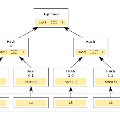The amount of information generated grows as more and more sensor and IoT devices are deployed in smart cities. It is of utmost importance for us to consider the privacy data leakage and compromised identity from both outside adversaries and inside abuse of data access privilege. The security assumption of the system should not solely rely on the fact that permission and access control were being implemented correctly. Quite the contrary, a system can be designed in a way that user's identity data and usage traces are not leaked even if the system had been compromised. Based upon our previous on-street parking system utilizing Bluetooth Low Energy (BLE) beacons, we applied a cryptographic primitive called zero-knowledge proof to our authentication system. A commitment scheme and Merkle tree is combined in the setup to achieve zero-knowledge set membership proof. Doing so, the user is anonymous to the server between authentication sessions, while the server's still able to verify the legitimacy of such user. The on-street parking system is therefore immune to privacy data leakage, as for now one cannot mass-query and profile certain user's traces within the system.
翻译:随着越来越多的感应器和IoT装置在智能城市部署,生成的信息数量不断增加;我们考虑外部对手和内部滥用数据访问特权的私隐数据泄漏和被泄露的身份至关重要;系统的安全假设不应仅仅依赖于许可和访问控制得到正确执行这一事实。恰恰相反,一个系统的设计方式可以使用户的身份数据和使用痕迹不被泄漏,即使系统已经失密。根据我们以前利用蓝牙低能信标在街上的停车系统,我们对认证系统应用了一个加密原始的称为零知识证明的加密原始系统。一个承诺计划和Merkle树在设置时合在一起,以达到零知识成员证明。这样做时,用户在验证会议之间匿名到服务器,而服务器仍然能够核实这些用户的合法性。因此,在线停车系统对隐私数据泄漏具有免疫性,因为现在无法对系统内的某些用户进行大规模搜索和描述。



